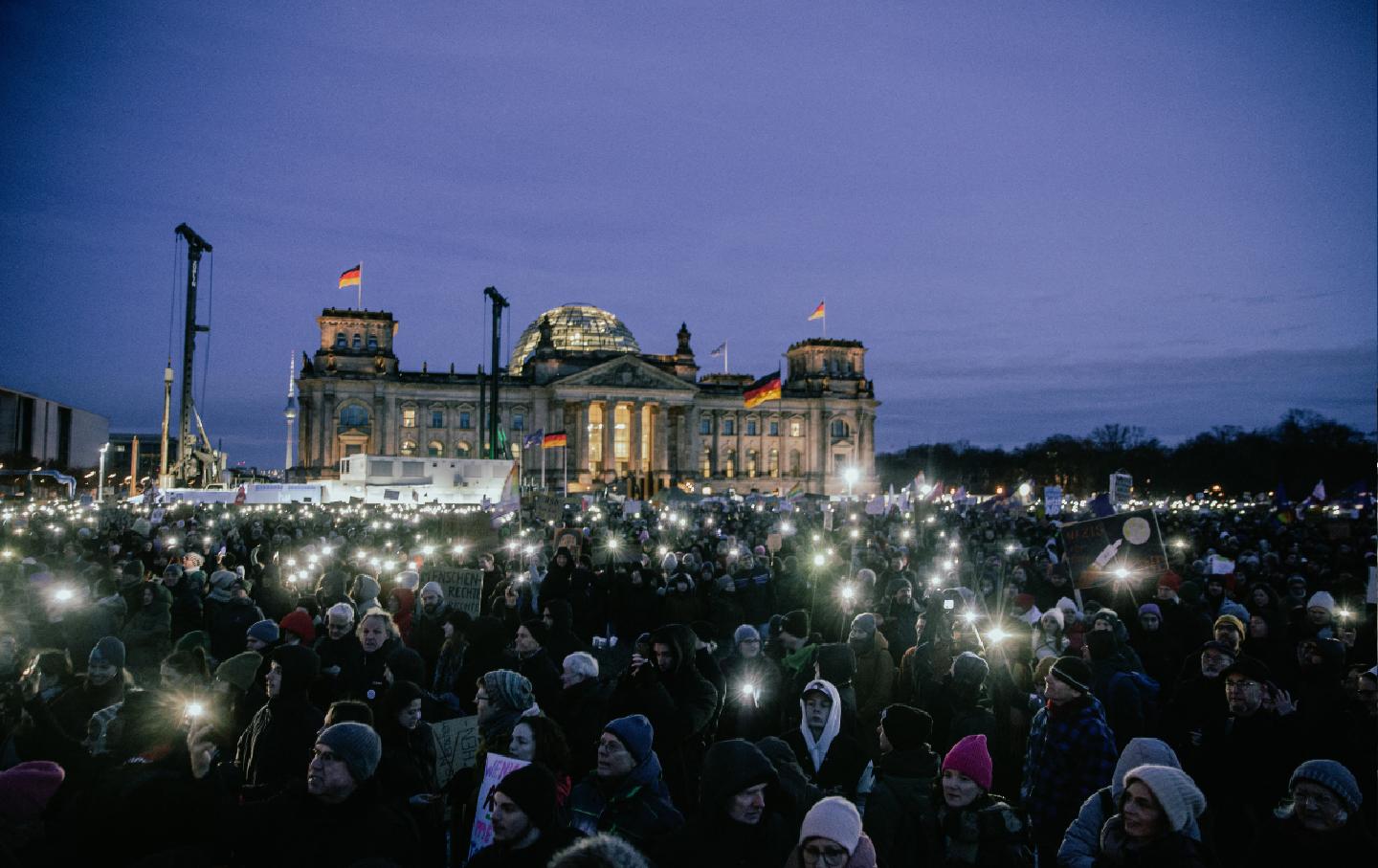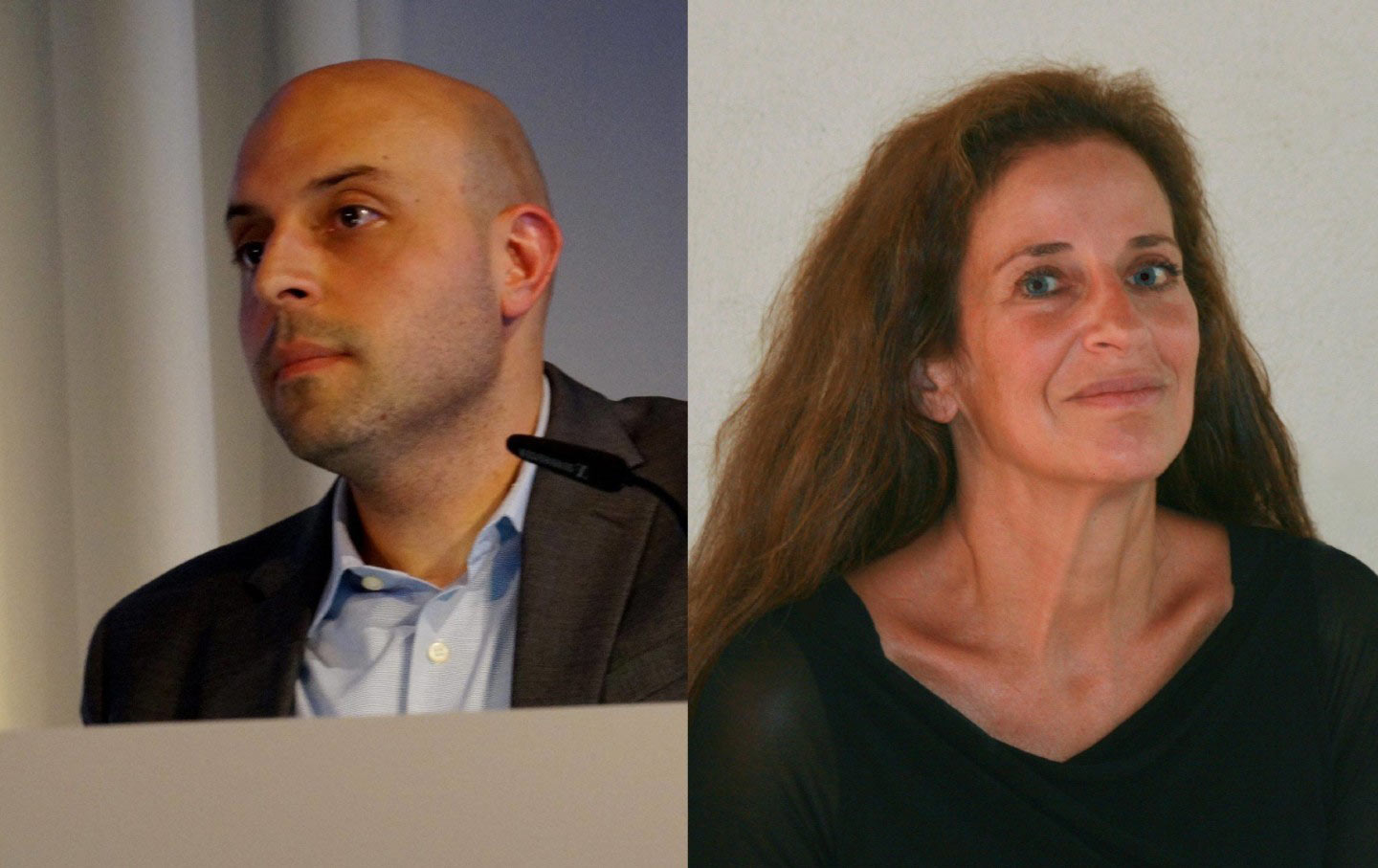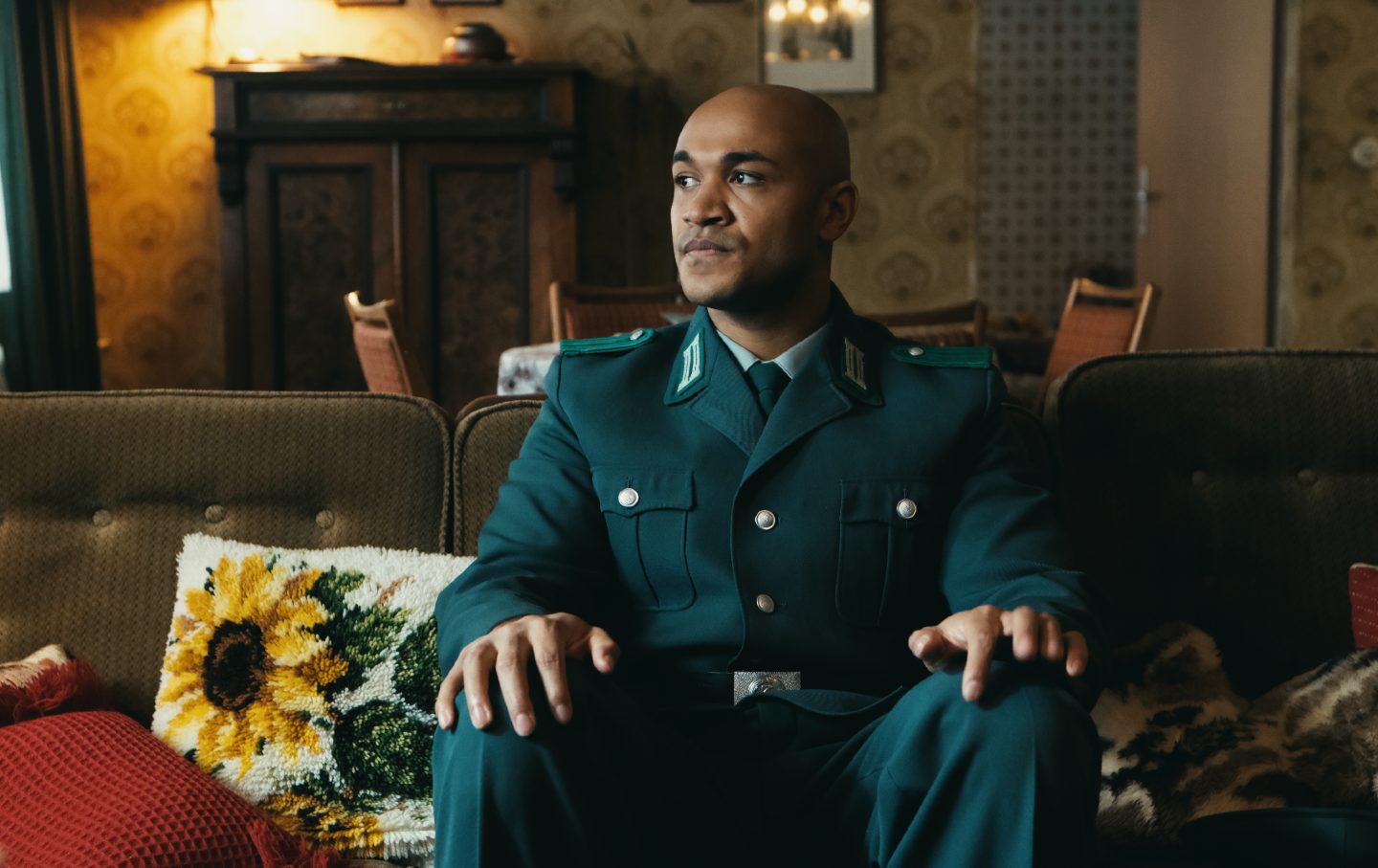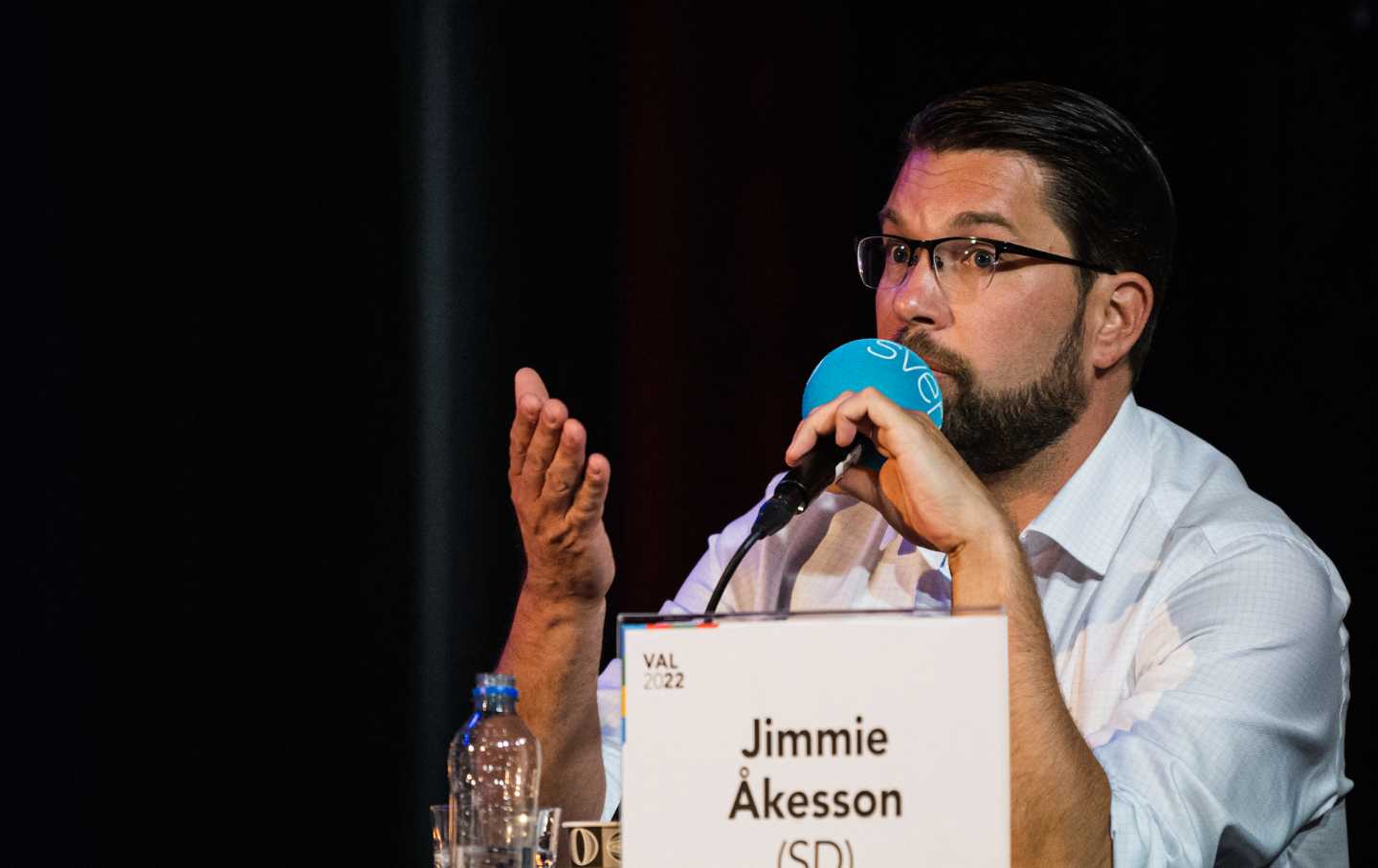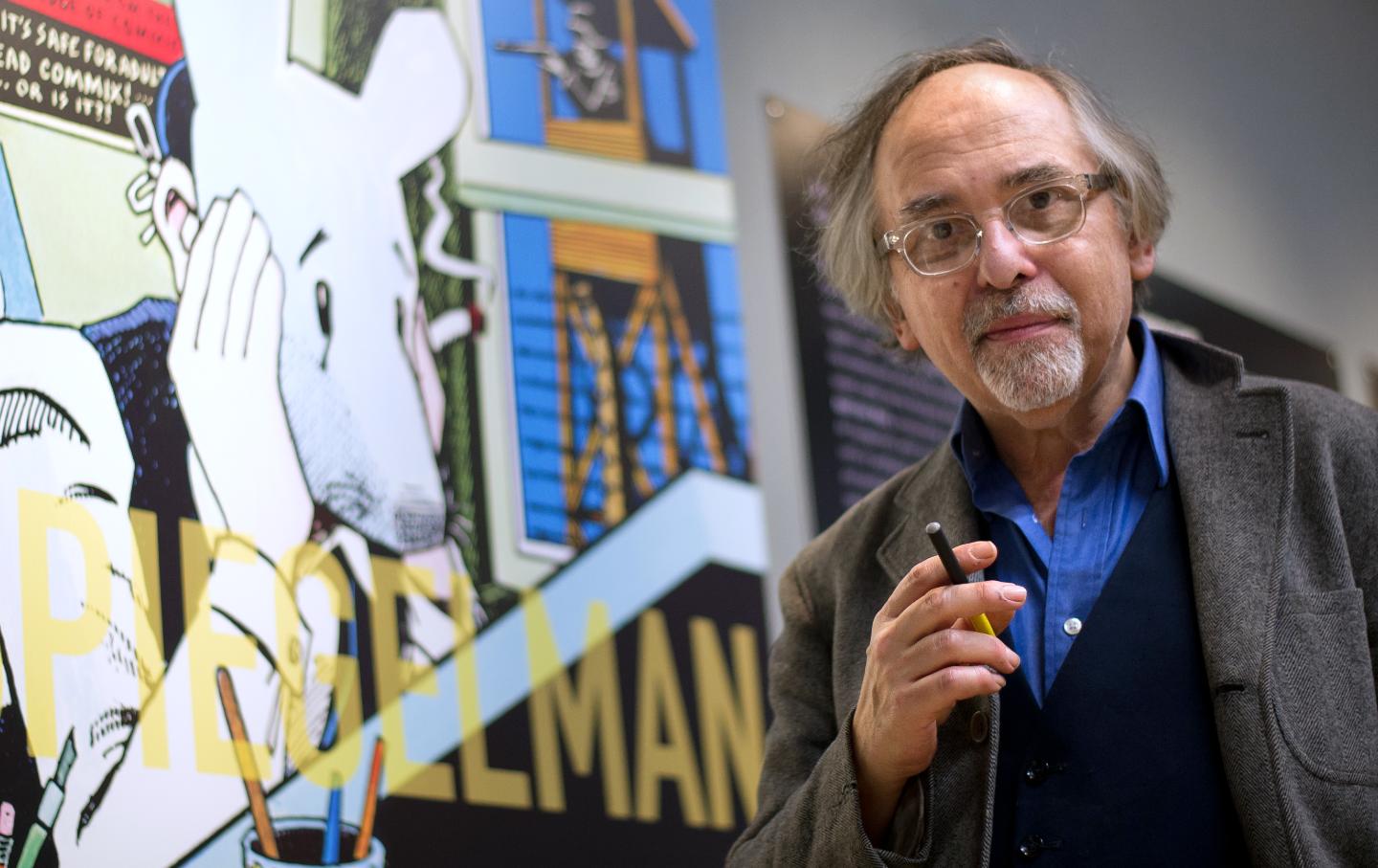Germany’s Theater of Memory: “Some People Already See the Flames. Others Don’t Even Smell the Smoke.”
A conversation with Max Czollek about Germans, Jews, Muslims, migration, and the aftermath of October 7 and the war in Gaza.
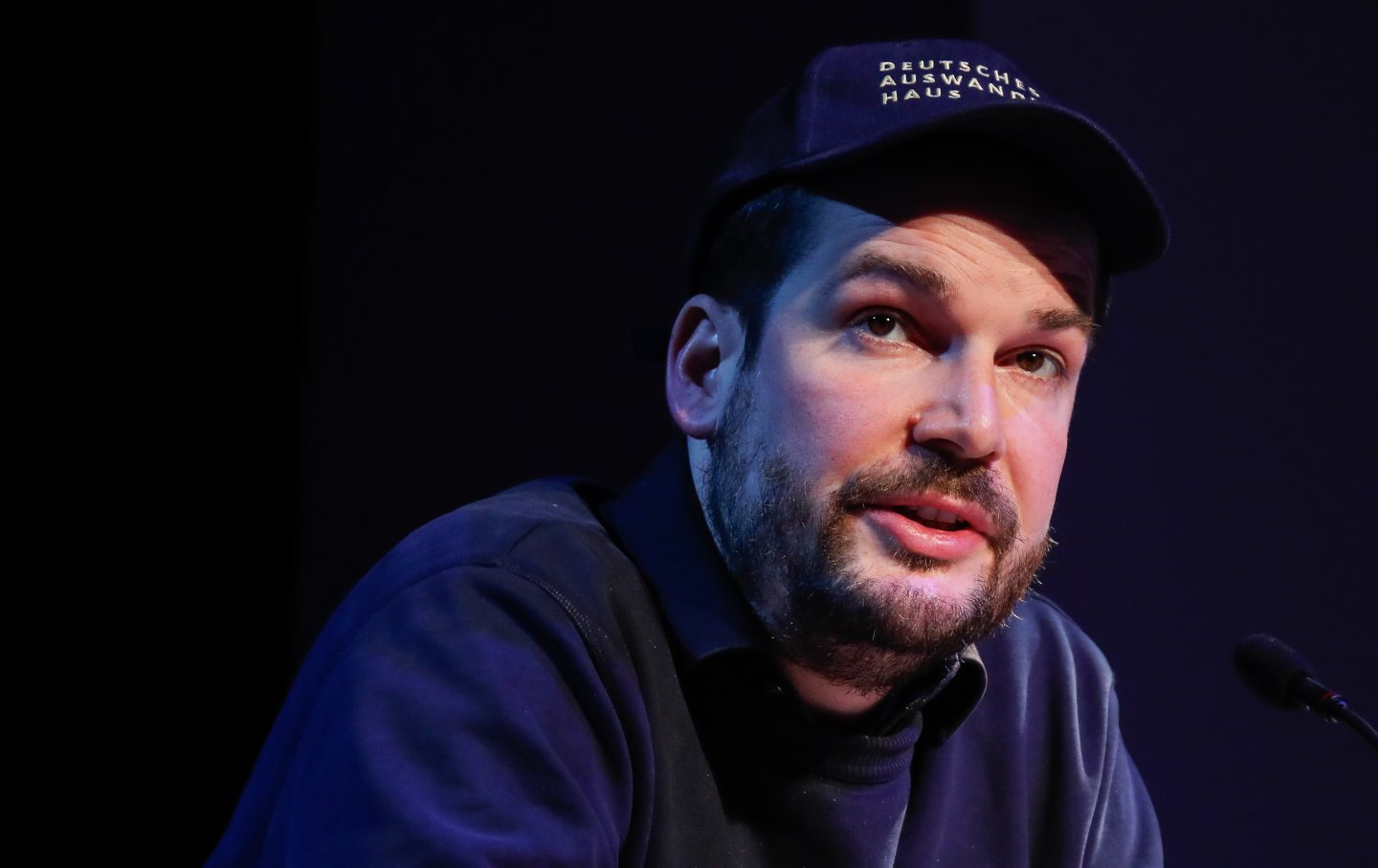
“Biographical confession is the active capital of every minoritized individual. It is the fuel of ‘migrant,’ ‘Jewish,’ ‘queer,’ or ‘feminist’ art whose contents are first tapped, then refined, and finally consumed by a greedy public,” writes Max Czollek at the start of De-Integrate!: A Jewish Survival Guide for the 21st Century. De-Integrate! is not a biographical confession but instead argues for “radical diversity” and against allowing your identity to be defined by the dominant culture. In Czollek’s native Germany, it was a bestseller. The Frankfurter Allgemeine Zeitung called the book “unapologetic and pugnacious, loud and sexy.” Die Zeit pronounced it “a renunciation…of the German self-adulation as world champions when it comes to a culture of remembrance.” An English language version of De-Integrate! was recently published in the United States (translated by Jon Cho-Polizzi).
Czollek was born in East Berlin in 1987 and is a poet, playwright, and political scientist. He has a PhD from the Center for Research on Antisemitism at the Technische Universität Berlin. At the Maxim Gorki Theater Berlin, he organized “De-Integration: A Congress on Contemporary Jewish Thought, and Radical Jewish Culture Days” with Sasha Marianna Salzmann. De-Integrate!, said Czollek, is a book that grew out of those events, “a nonobjective account of what it means to be Jewish in Germany today and…go beyond the Theater of Memory.” Czollek estimates that there are about 200,000 Jews living in Germany today. He refuses to use the word “community” to describe them, as they are a diverse population. Czollek and I spoke on Zoom.
—Linda Mannheim
Linda Mannheim: Can you explain what the Theater of Memory is to people who haven’t heard the term before?
Max Czollek: The Theater of Memory describes the way German dominant culture tries to reinvent itself and the way Jews are assigned a role in this German notion of “becoming good again.” The term itself is not my invention. It came from the sociologist Michal Bodemann. But at the Gorki Theater, we took the “Theater” part quite literally and used the stage as a place to develop a new concept of Jewishness as a migrant, diverse presence. Over 90 percent of the Jews living in Germany today come from the former Soviet Union and more from places all over the world.
LM: And Jews from the former Soviet Union have a very different history than Jews who were living in Germany pre-war.
MC: Yes, instead of being liberated from Auschwitz, they liberated Auschwitz. That history is not visible within the Theater of Memory because the German side doesn’t like thinking about itself as defeated by [Soviet] Jews.
LM: When I described De-Integrate! to people, I say: It’s about being Jewish in Germany, but it’s for people who are minoritized in any culture, and it’s about not letting the majority culture define your identity.
MC: Yes, it’s about reimagining society as a place of radical diversity [instead of a place] with one dominant culture where everybody else has to integrate [and] respond to questions and demands being asked by people from the dominant culture. And it’s about changing the framework, because the “integration” framework we’re still using in Germany is the same old nationalistic völkische framework that makes it possible for the [far-right political party] AfD to gain more than 20 percent in the polls.
LM: In a way, the concept of integration in Germany is like the concept of assimilation in the US. And you wrote, it “derives from the fantasy that there is some essential difference between German and non-German ancestry, German and non-German behavior, German and non-German culture.”
MC: The fantasy is [that German culture] has to be relatively homogeneous, has to be relatively hierarchized, and has to have one center. Someone who believes that essentially believes that diversity is a threat to society instead of its basis. And those people behave accordingly.
LM: And one of the things you’ve said is that Germany has never been monocultural, aside from the Nazi era.
MC: The reality is, literally nothing in contemporary German culture has remained untouched by migration, which is why many people speak of a post-migrant society. But this is also true for the past when people who were Jewish, queer, Sinti, and Roma etc. contributed to what then came to be called German culture. The demand—to “integrate,” to first become German then contribute to the culture—has it all upside down. German culture is already the result of all these different influences.
LM: One of the things the book aims for is solidarity rather than integration. You wrote, “Those who dream of a Germany without Muslims also dream of a Germany without Jews.” Can you say more about the solidarity?
MC: This also grew out of our [work at] the Gorki Theater, where people from different backgrounds came together to reformulate this idea of what German society is and what stories have to be told. We wanted to create a society that’s less violent in the present than it has been in the past. The line you’re quoting was a response to [the majority culture’s attempts] to use Jews as a leverage against other minorities—something that has been going on not only since October 7 but for the last decade at least. You have politicians saying: “We defend the Jews against the Muslims” while overlooking all evidence that [anti-Semitism and violence] is also part of [the non-Muslim German story]. I was proposing Jewish-Muslim allyship as a way to say, “This is going to be all of us together or none of us.” Which is a story that has been shaken up since October 7.
LM: This seems like a really good point to start talking about what Germany has been like since October 7—during the Israel-Hamas War.
MC: October 7 was used [by the German majority culture] as way [to claim that] Muslims have become the greatest threat to Jewish life, which certainly isn’t true in a German context. Statistics simply don’t support this claim. And this is a great example of how the Theater of Memory works: politicians using the notion of “Never Again” to push through, for example, a stronger anti–asylum seeker policy. So suddenly the idea of Memory Culture is being connected to this idea of controlling immigration and controlling who belongs and who doesn’t.
At the same time, the aftermath of those events challenged our ideas about a post-migrant society, which had been at the center of our political and artistic work for the last 15 years. It suddenly became very clear that people who are marginalized are still very much part of a society that discriminates against others. So obviously Jews can be anti-Muslim or racist—and Muslims can be anti-Semitic.
After October 7, a lot of my Jewish friends—especially those who had been working in intersectional contexts—felt that they didn’t receive the kind of solidarity that they had provided the years before. And the rise in anti-Semitism following the Hamas attacks was really something. I’ve been under a security profile [at public appearances] since October 7.
And I think it’s very, very important to understand that the German context is not the Israeli context. In Germany, Jews are very exposed. Like there’s not much they can do if they’re being attacked, except hope for some kind of protection that either comes from an antifa or from the police—it has to come from somewhere. This was part of what our vision of a post-migrant society was supposed to stand for.
LM: A lot of Americans who are in Germany, who are Jewish, are explaining their perspective, but it’s a really different perspective than Jewish Germans have.
MC: Being an American Jew in Germany and being an Israeli Jew in Germany and being a Jew from a family that has lived in Germany are very different things. For example, this whole discussion about Jews becoming white is very abstract for Jewish Germans. Jews may have become white in the States, but this doesn’t mean they have become white everywhere. If you look at poverty statistics among [Jews] who migrated to Germany from the former Soviet Union, or if I take my own family and the price they paid for what Germany did to them, I can assure you, they’re not part of the dominant culture—if this is what you mean by whiteness.
I also see US Jews who are disappointed with German Memory Culture. I would argue that in order to be disappointed like this you need to have had faith in it before. Jews who grew up in Germany never could afford such luxury. There has never been any doubt in my mind that Memory Culture primarily served the needs and desires of the German dominant culture. This doesn’t mean that Germans don’t feel regret or aren’t sincere in their memory work—but rather, that ultimately, it’s about themselves.
And I would argue that in Germany, the question of Israel is something that is being used in the Theater of Memory. While the international group tends to make your position on Israel determine whether you’re left wing or right wing, for Jews who grew up in Germany, it’s not like that. For us, the pressure to speak about Israel is a lot like [the pressure] Turkish Germans feel to talk about Erdoğan’s policies. It’s not like Jews don’t have an opinion on Israel; they just don’t want to be pushed to talk about it. And if they are, there is good reason to consider this pressure anti-Semitic just as it is racist in other cases.
One last point: The stuff that has happened in the last few months has pushed us closer to giving up before we even start to confront the real challenges that lie ahead within the German framework, the real danger and continuities of violence that might take place here.
LM: Are you thinking about the rise of nationalism and the far right?
MC: Yes. It’s the return of a very closed idea of what it means to belong. And this is going to hit minorities first, as it always does while the mainstream seems unbothered. Some people already see the flames. Others don’t even smell the smoke. And this is something that really worries me, because now we still have the capacity to resist this development. But the longer we keep on ignoring it, the less we’re going to be able to defend against it.
Within the German framework, we have been building on this idea of post-migrant society as a real alternative to this homogenous idea of being German. And this is the project that has become under intense pressure in the last months. And I feel like right now we have to be very careful not to destroy it. There’s something at stake, and it’s not the Israeli-Palestinian conflict. It’s something that is profoundly connected to the German situation right now. And we will need all the strength we can muster.
* * *
After Czollek and I spoke on Zoom, the Heinrich Böll Foundation and the Bremen Senate, sponsors of the Hannah Arendt Prize for Political Thought, decided to withdraw from awarding the prize to Masha Gessen. The award itself was not withdrawn, but the organizations did not want to participate in the award ceremony. Gessen was believed by to some to have, in a recent New Yorker essay, to have “relativized” the Holocaust. The term has historically been used in Germany to describe a comparison intended to trivialise the Holocaust (most often in response to statements by those on the right and far right). The award ceremony went ahead a day later than planned, in a smaller venue, without the sponsoring organizations. I e-mailed Czollek to ask what his thoughts were about this.
“Gessen has pushed the current limits on free speech in Germany,” he responded. “And the publication date of their essay—right before the award ceremony—suggests that Gessen knew what they were doing. Do I think the comparison of Gaza to the Warsaw Ghetto and Israel’s military campaign to its liquidation by the Nazis was living up to the standards of intellectual work? No. Is it down the lines of Hannah Arendt’s own tendency to exaggerate? Yes. Do I think that it should be protected under freedom of speech? No doubt. And this is exactly where the German public departs from any real regard for the diversity of living Jews. Ultimately, Memory Culture is about themselves, vis-à-vis a symbolic position of “Jews” and “Israel.” In this, living Jews, just like real Israeli politics, are mostly a nuisance to be dealt with. A point made convincingly, by the way, in Masha Gessen’s essay.”
We cannot back down
We now confront a second Trump presidency.
There’s not a moment to lose. We must harness our fears, our grief, and yes, our anger, to resist the dangerous policies Donald Trump will unleash on our country. We rededicate ourselves to our role as journalists and writers of principle and conscience.
Today, we also steel ourselves for the fight ahead. It will demand a fearless spirit, an informed mind, wise analysis, and humane resistance. We face the enactment of Project 2025, a far-right supreme court, political authoritarianism, increasing inequality and record homelessness, a looming climate crisis, and conflicts abroad. The Nation will expose and propose, nurture investigative reporting, and stand together as a community to keep hope and possibility alive. The Nation’s work will continue—as it has in good and not-so-good times—to develop alternative ideas and visions, to deepen our mission of truth-telling and deep reporting, and to further solidarity in a nation divided.
Armed with a remarkable 160 years of bold, independent journalism, our mandate today remains the same as when abolitionists first founded The Nation—to uphold the principles of democracy and freedom, serve as a beacon through the darkest days of resistance, and to envision and struggle for a brighter future.
The day is dark, the forces arrayed are tenacious, but as the late Nation editorial board member Toni Morrison wrote “No! This is precisely the time when artists go to work. There is no time for despair, no place for self-pity, no need for silence, no room for fear. We speak, we write, we do language. That is how civilizations heal.”
I urge you to stand with The Nation and donate today.
Onwards,
Katrina vanden Heuvel
Editorial Director and Publisher, The Nation

